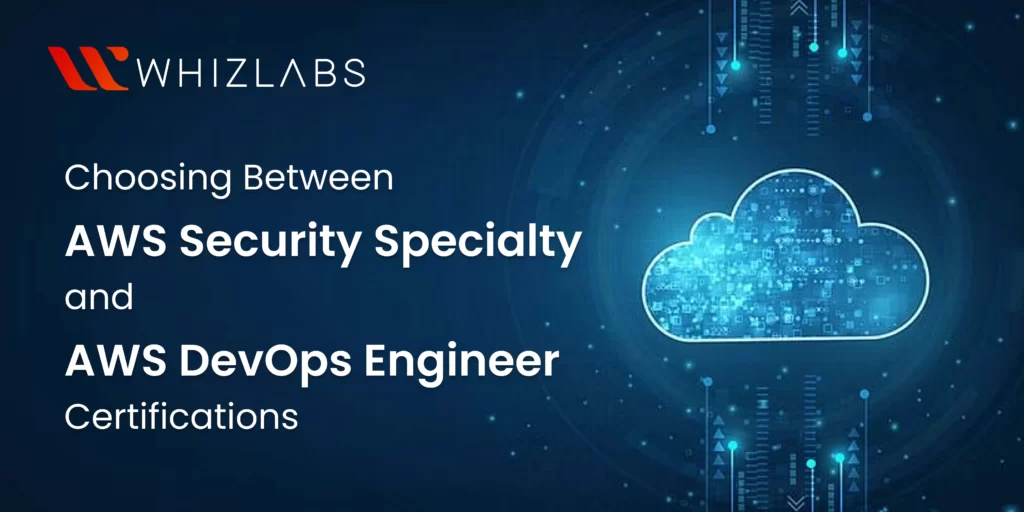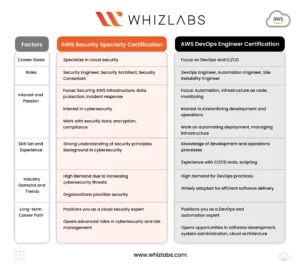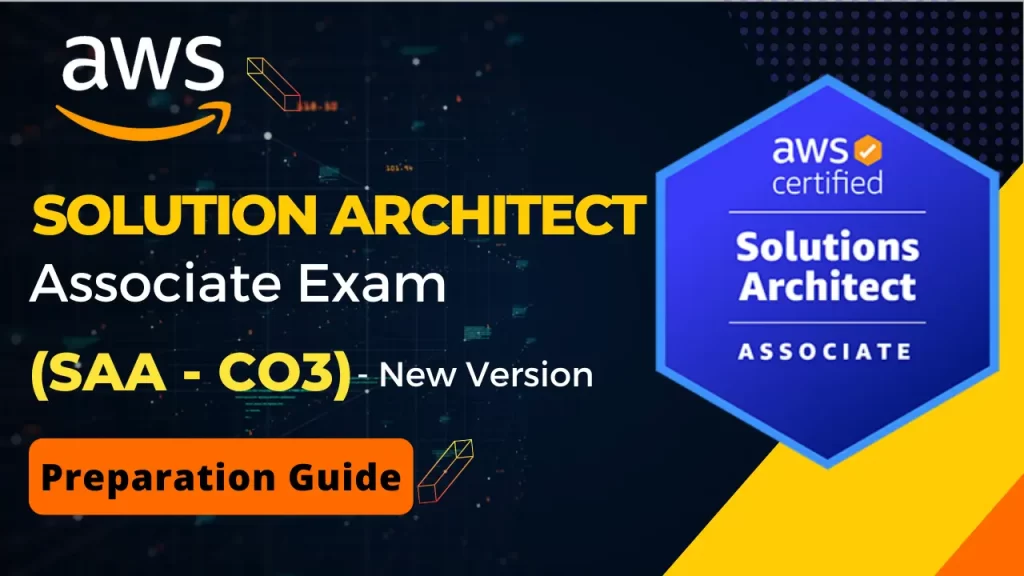When it comes to AWS certifications, AWS Security Specialty and AWS DevOps Engineer certifications are highly demanded in the cloud computing industry. These certifications not only validate your skills but also open up a world of career opportunities in the ever-growing field of cloud infrastructure.
But how do you decide which certification to go for, and which one aligns with your career goals?
If you are passionate about securing cloud environments, have a strong understanding of security protocols, and enjoy identifying and mitigating risks, then the AWS Security Specialty certification might be the right choice for you. This certification focuses on securing AWS workloads and data, ensuring compliance, and implementing best practices for security.
On the other hand, if you thrive on building and deploying applications, have a talent for automating processes, and enjoy managing CI/CD pipelines, then AWS DevOps Engineer certification could be a better fit. This certification emphasizes automating infrastructure, continuous integration and delivery, and maintaining high availability of applications on AWS.
In this blog, we will delve into the key differences between the AWS Security Specialty vs AWS DevOps Engineer certifications, helping you make an informed decision on which path to choose.
Let’s dive in!
AWS Security Specialty vs AWS DevOps Engineer Certifications Overview:
AWS Certified Security Specialty Certification
This certification is designed for professionals who focus on securing the AWS platform. This certification also tells about the AWS Security best practices types of data classifications and how to protect data using AWS tools. It covers data encryption methods and how to implement them with AWS, as well as secure internet protocols and the AWS mechanisms for using them.
It validates advanced skills in securing complex cloud environments and covers domains such as:
- Threat detection & Incident response
- Logging and monitoring
- Infrastructure security
- Identity and access management
- Data protection
- Management & security governance
Key Skills Acquired in AWS Security Specialty Certification
Through this certification, candidates gain hands-on experience in:
- Implementing security controls across AWS services
- Designing and implementing secure architectures
- Managing access and identity
- Performing security assessments
AWS Certified DevOps Engineer Professional Certification
This AWS DevOps engineer certification is tailored for professionals involved in the implementation and management of continuous delivery systems and methodologies on AWS. It validates expertise in:
- Continuous delivery and automation of processes
- Monitoring and logging practices
- Security controls and governance processes
- Incident and event response
- High availability, disaster recovery, and fault tolerance
Key Skills Acquired in AWS DevOps Engineer Certification
Candidates gain expertise in:
- Automating application deployments
- Integrating CI/CD pipelines
- Monitoring application performance
- Managing infrastructure as code
- Ensuring scalability and reliability of systems
The above skills are essential for roles focused on enhancing the efficiency of development and operations processes.
Factors to consider when choosing between AWS Security Specialty vs DevOps Engineer certification
AWS Security Specialty vs DevOps Engineer: Roles & Responsibilities
AWS Security Specialty Roles and Responsibilities
As an AWS Security Specialty professional, the responsibilities cover a wide range of security tasks, from designing secure architectures to events. Their daily duties can range from implementing security controls to monitoring for potential security breaches, ensuring that every aspect of the AWS environment adheres to the highest security standards.
Other primary responsibilities include:
- Craft secure architectural designs for AWS environments that align with industry best practices and compliance requirements.
- Implement and manage security controls using tools such as AWS Identity and Access Management (IAM), AWS CloudTrail, and AWS Config.
- Conduct regular security assessments and audits to identify vulnerabilities and recommend appropriate mitigation strategies.
- Monitoring and analyzing security logs and then alerts to detect and respond to potential security events.
- Ensure compliance with regulatory requirements, such as GDPR, HIPAA, and SOC 2, by implementing necessary security measures and documentation.
- Develop and enforce security policies and procedures to guide the organization’s security practices and ensure consistent application across all AWS services.
- Use automation tools like AWS CloudFormation and AWS Lambda to automate security tasks and improve the efficiency of security operations.
- Perform penetration testing and vulnerability scanning to identify and remediate security weaknesses within the AWS environment.
- Collaborate with development and operations teams to integrate security into the DevOps processes, ensuring secure coding practices and continuous monitoring.
- Manage encryption and key management services to protect sensitive data both in transit and at rest.
AWS DevOps Engineer Roles and Responsibilities
As an AWS DevOps Engineer role, it needs to streamline the software development lifecycle, from code development to deployment and monitoring. The DevOps engineers use a variety of AWS tools and services to automate processes and ensure that applications run smoothly and efficiently.
Other primary responsibilities include:
- Design and implement CI/CD pipelines using AWS CodePipeline, Jenkins, or other relevant tools to automate the deployment of applications.
- Automate infrastructure provisioning using Infrastructure as Code (IaC) tools like AWS CloudFormation, Terraform, and Ansible.
- Monitor and manage application performance, ensuring high availability and scalability through tools like AWS CloudWatch and AWS X-Ray.
- Configure and manage AWS services such as EC2, S3, RDS, and Lambda to support application requirements.
- Implement infrastructure security measures, including network security, data encryption, and identity and access management.
- Develop and maintain automation scripts to streamline operational tasks and reduce manual interventions.
- Ensure the reliability and performance of systems by setting up monitoring, logging, and alerting mechanisms to promptly detect and address issues.
- Collaborate with development teams to ensure that applications are designed for scalability, reliability, and performance.
- Optimize cloud resource usage to achieve cost-efficiency while maintaining system performance.
- Implement disaster recovery and backup strategies to protect against data loss and ensure business continuity.
- Maintain documentation for all automated processes, configurations, and operational procedures to ensure transparency and facilitate troubleshooting.
AWS Security Specialty vs AWS DevOps Engineer: Job and salary outlook
AWS Security Specialty: Job Outlook
The demand for cloud security professionals is on the rise, driven by the increasing number of cyber threats and the critical need for organizations to protect their data. As a result, the AWS Security Specialty certification is highly valued in the job market.
Professionals with this certification can pursue various roles, including:
- Security Analyst: Focuses on identifying and mitigating security threats within AWS environments.
- Security Consultant: Provides expert advice on designing and implementing secure cloud architectures.
- Cloud Security Engineer: Builds and maintains secure AWS infrastructures, implementing security best practices.
- Information Security Manager: Oversees the overall security posture of an organization’s AWS environment.
AWS Security Specialty: Salary Outlook
The salary for AWS Security Specialty professionals are attractive, reflecting the high demand for their expertise. According to common industry surveys, average salaries for these roles are as follows:
- Security Analyst: $90,000 – $120,000 per year
- Security Consultant: $100,000 – $130,000 per year
- Cloud Security Engineer: $110,000 – $140,000 per year
- Information Security Manager: $120,000 – $160,000 per year
AWS DevOps Engineer: Job Outlook
The role of DevOps Engineers is becoming increasingly in demand as organizations seek to streamline their software development and operational processes. The AWS DevOps Engineer certification equips professionals with the skills needed to automate and manage these processes, making them highly valuable in the job market.
Certified AWS DevOps Engineers can pursue roles such as:
- DevOps Engineer: Implements and manages CI/CD pipelines, automates deployments, and ensures system reliability.
- Systems Administrator: Manages the operational aspects of cloud environments, ensuring smooth performance and security.
- Cloud Engineer: Designs and manages scalable cloud solutions, optimizing for performance and cost-efficiency.
- Site Reliability Engineer (SRE): Focuses on improving system reliability and performance through automation and monitoring.
AWS DevOps Engineer: Salary Outlook
Salaries for AWS DevOps Engineers are competitive, reflecting the high demand for their skills in automation and cloud management. The average salaries for these roles are as follows:
- DevOps Engineer: $95,000 – $130,000 per year
- Systems Administrator: $80,000 – $110,000 per year
- Cloud Engineer: $100,000 – $135,000 per year
- Site Reliability Engineer (SRE): $105,000 – $140,000 per year
Glassdoor offers detailed insights into the salaries for both certifications
Choosing the Right Certification
When choosing between the AWS Security Specialty vs DevOps Engineer certifications, it is essential to consider your career goals and interests. If you are passionate about security, data protection, and compliance, the AWS Security Specialty may be the right fit.
Conversely, if you enjoy automation, continuous integration, and streamlining operations, the AWS DevOps Engineer certification might align better with your aspirations.
Demand in the Job Market
Both certifications are highly valued in the job market, but they cater to different needs. Companies with a strong focus on security and compliance might prioritize candidates with the AWS Security Specialty certification. In contrast, organizations looking to enhance their development and operational efficiencies may seek professionals with the AWS DevOps Engineer certification.
Long-term Career Benefits
Each certification offers long-term career benefits. The AWS Security Specialty can lead to advanced roles in cybersecurity and compliance, areas that are increasingly critical as cyber threats evolve. The AWS DevOps Engineer certification opens doors to various roles in development and operations, with opportunities to lead initiatives that drive innovation and efficiency.
Preparation Strategies for AWS Security Specialty
To prepare for the AWS Security Specialty exam, candidates should leverage a variety of resources, including:
- AWS official training courses on AWS Security Specialty
- Practice exams, self-study courses
- Online study groups
- AWS whitepapers and documentation
Consistent practice and hands-on experience with AWS security services are key to mastering the exam content.
Preparation Strategies for AWS DevOps Engineer
Preparation for the AWS DevOps Engineer certification also involves a mix of study materials:
- AWS official training courses focused on DevOps
- Practice exams, hands-on labs
- Online forums and communities
- AWS whitepapers and documentation
Gaining practical experience through projects and real-world applications of DevOps principles will significantly enhance your understanding and readiness for the exam.
Time Investment and Exam Costs
Both certifications require a substantial time investment and financial commitment. It is essential to plan your study schedule and allocate sufficient time for preparation. Exam fees, training courses, and additional study materials should be factored into your budget.
Industry Insights and Trends
The demand for cloud security experts and DevOps professionals continues to rise. As businesses increasingly rely on cloud services, the need for specialized skills in both security and DevOps is more pronounced than ever. Keeping abreast of industry trends and continuously updating your skills will ensure you remain competitive in the job market.
Personal Experiences and Testimonials
Hearing from individuals who have pursued these certifications can provide valuable insights. Success stories and testimonials highlight the practical applications of the skills learned and how these certifications have impacted careers. Many professionals report increased job opportunities, higher salaries, and greater job satisfaction after obtaining these certifications.
Conclusion
I hope this blog post has provided valuable insights to help you make an informed decision.
Choosing between the AWS Security Specialty and AWS DevOps Engineer certifications ultimately depends on your career goals and specific skill set. If you are passionate about safeguarding cloud environments and have a strong foundation in security principles, the AWS Security Specialty certification is likely the better choice.
On the other hand, if you like automating and optimizing IT processes to accelerate software delivery, the AWS DevOps Engineer certification aligns more closely with your interests. It validates your ability to build and deploy scalable, reliable, and efficient systems, making you a valuable asset for any development team.
Remember, these certifications are not mutually exclusive. Many professionals hold both to expand their skill set and increase their career opportunities. Ultimately, the best path is the one that excites you and aligns with your long-term career goals.
Frequently Asked Questions
1. What is the difference between AWS Security Specialty and AWS DevOps Engineer certifications?
The AWS Security Specialty focuses on security best practices and compliance within the AWS ecosystem, while the AWS DevOps Engineer emphasizes automation, continuous integration, and improving development and operations processes.
2. Which certification is better for a career in cybersecurity?
The AWS Security Specialty is more suited for a career in cybersecurity, as it delves deeply into security protocols, threat management, and data protection.
3. Are there any prerequisites for taking the AWS Security Specialty or AWS DevOps Engineer exams?
While there are no official prerequisites for either exam, AWS recommends that candidates have a minimum of two years of hands-on experience with AWS for the Security Specialty and experience in provisioning, operating, and managing AWS environments for the DevOps Engineer certification.
- What Is the Role of AWS Lambda in AI Model Deployment? - April 2, 2025
- What Are ETL Best Practices for AWS Data Engineers - March 17, 2025
- How to Create Secure User Authentication with AWS Cognito for Cloud Applications - September 30, 2024
- 2024 Roadmap to AWS Security Specialty Certification Success - August 16, 2024
- Top 25 AWS Full Stack Developer Interview Questions & Answers - August 14, 2024
- AWS Machine Learning Specialty vs Google ML Engineer – Difference - August 9, 2024
- Deploy a serverless architecture using AWS Lambda and Amazon API Gateway - August 9, 2024
- Mastering AWS SDK Integration in Node.js: A Step-by-Step Guide - August 8, 2024


